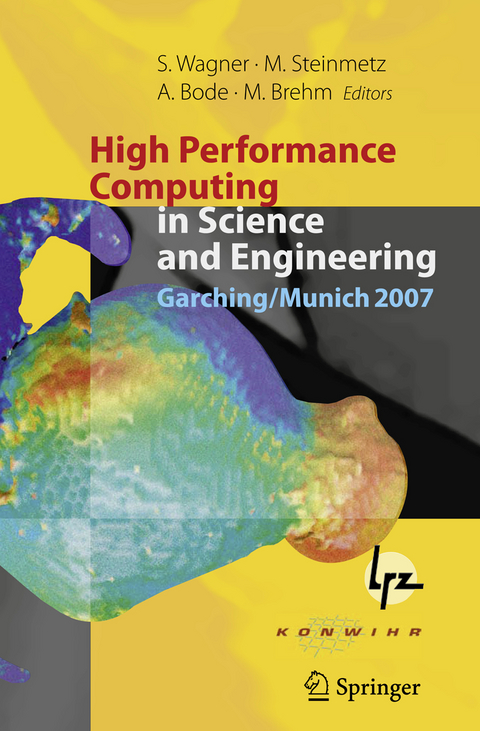
High Performance Computing in Science and Engineering, Garching/Munich 2007
Springer Berlin (Verlag)
978-3-642-08868-1 (ISBN)
Prof. Dr. Arndt Bode wurde 1987 auf den Lehrstuhl für Rechnertechnik und Rechnerorganisation in der Fakultät für Informatik der TUM berufen. Seine wichtigsten Arbeitsgebiete sind technische Informatik, Rechnerarchitektur, Supercomputer, parallele und verteilte Systeme, Entwicklungswerkzeuge sowie verteilte Anwendungen. Daneben gilt sein besonderes Engagement der fachübergreifenden Kooperation in Forschung und Lehre für Informatikprodukte, der Standardisierung von Grundsoftware für parallele und verteilte Systeme sowie dem Technologietransfer. Von Bodes hoher wissenschaftlicher Qualifikation zeugen über 200 Fachpublikationen, darunter Bücher über Rechnerarchitektur, Mikroprogrammierung, Mikroprozessoren und Anwendungen. Diese wurde unter anderem honoriert mit dem "Fellowship des Department of Employment, Education and Training", Canberra, Australien, dem "Best University Research Demonstration Award CONPAR 1990", Zürich und dem "Award for Online Visualization, CONPAR 90", ETH Zürich. Bode ist auch Herausgeber verschiedener nationaler und internationaler Buchreihen und wissenschaftlicher Zeitschriften, seit 1999 Hauptherausgeber des Informatik-Spektrum, Springer Verlag. Bode ist national und international ein sehr gefragter Gutachter und Mitglied in zahlreichen Fachgesellschaften. Seit 1994 gehört er der Kommission für Informatik der Bayerischen Akademie der Wissenschaften an, seit 1999 der Kommission für Rechenanlagen der Deutschen Forschungsgemeinschaft. Ebenso übt er zahlreiche Tätigkeiten als Berater für nationale und internationale Unternehmen aus. Im Februar 2005 ist Prof. Bode für weitere drei Jahre in seinem Amt als Vizepräsident und CIO der TU München bestätigt worden.
Astrophysics.- Numerical Simulations of Compact Binary Systems.- Ab Initio Vlasov Code Simulation of Micro-Turbulence, Phase Space Structure Formation and the Resulting Anomalous Transport and Particle Acceleration in Collisionless Astrophysical Plasmas, I: The 2D2V Code.- The ART of Cosmological Simulations.- Modeling of Turbulent Flows Applied to Numerical Simulations of Galaxy Clusters.- The Onset of Convection During the Core Helium Flash.- Formation of the First Supermassive Black Holes in the Early Universe.- Star Formation in the Turbulent Interstellar Medium and Its Implications on Galaxy Evolution.- The Aquarius Project: Cold Dark Matter under a Numerical Microscope.- Biosciences.- ParBaum: Large-Scale Maximum Likelihood-Based Phylogenetic Analyses.- Chemistry.- A Theoretical Study of Polyoxometalates and Dendrizyme Model Compounds.- Multi Dimensional Quantum Dynamics of Chemical Reaction Processes.- Investigating Protein-Protein and Protein-Ligand Interactions by Molecular Dynamics Simulations.- Probing the Mechanical Strength of Chemical Bonds by Stretching Single Molecules.- Plane Wave Density Functional Model Studies of Chemistry at Surfaces.- Oxidative Dehydrogenation of Simple Molecules over RuO2(110): Density Functional Theory Calculations.- Redox Catalysis and Reactivity of Metalloporphyrines.- Computational Fluid Dynamics.- Numerical Optimization of Compressor Casing Treatments for Influencing the Tip Gap Vortex.- High-Performance Computing for the Investigation of the Flow Past an Airfoil with Trailing-Edge Stall.- On the Turbulence Structure in Supersonic Nozzle Flow.- Large Scale CFD for Complex Flows.- Flow Simulations of an Axial Transonic Compressor Stage.- Gyrokinetic Turbulence Simulations for Fusion Plasmas.- A Parallel CFDSolver Using the Discontinuous Galerkin Approach.- A-priori Analysis of the LMSE Micromixing Model for Filtered-Density Function Simulation in High Schmidt Number Flows.- Characterization of the Dissipation Tensor from DNS of Grid-Generated Turbulence.- Numerical Investigation of the Noise Emission from Serrated Nozzles in Coaxial Jets.- Numerical Simulation of Fluid-Structure- and Fluid-Structure-Acoustic Interaction Based on a Partitioned Coupling Scheme.- Large-Eddy Simulation of Plane Jet Injection into Supersonic Turbulent Crossflow.- Simulation of the Flow around the Stratospheric Observatory for Infrared Astronomy SOFIA Using URANS and DES.- Direct Numerical Simulation of Flame/Acoustic Interactions.- Scaling Properties of Convective Turbulence.- Parallel Free-Surface and Multi-Phase Simulations in Complex Geometries Using Lattice Boltzmann Methods.- Dynamics of Heavy Particles in Turbulent Flows.- Interactive Indoor Thermal Comfort Evaluation.- DNS of Transition to Turbulence in a Linear Compressor Cascade.- Computer Science.- Some Applications of the PDE Solver FDEM with Error Estimate.- waLBerla: The Need for Large-Scale Super Computers.- Scalable Multigrid.- RZBENCH: Performance Evaluation of Current HPC Architectures Using Low-Level and Application Benchmarks.- Towards Scalable Parallel Numerical Algorithms and Dynamic Load Balancing Strategies.- The HLRB Cluster as Quantum CISC Compiler.- Concepts for Efficient Flow Solvers Based on Adaptive Cartesian Grids.- Challenges and Potentials of Emerging Multicore Architectures.- Geophysics.- A p-Adaptive Discontinuous Galerkin Method with Local Time Steps for Computational Seismology.- Predictability of Rayleigh-Number and Continental-Growth Evolution of a Dynamic Model of the Earth's Mantle.-Quantifying Uncertainties in Earthquake Scenario Ground Motion Calculations: Finite Source Effects.- High Energy Physics.- Dynamical Lattice QCD with Ginsparg-Wilson-Type Fermions.- Simulation of N f =2+1 Lattice QCD at Realistic Quark Masses.- Solid State Physics.- Long-Range Chiral Recognition Due to Substrate Locking and Substrate-Adsorbate Charge Transfer.- Quantum Transport within a Background Medium: Fluctuations versus Correlations.- Quantum Monte Carlo Studies of Strongly Correlated Electron Systems.- Charge Transport through Guanine Crystals.- Electronic Charge and Orbital Reconstruction at Cuprate-Titanate Interfaces.- Compensation Mechanisms and Functionality of Transition Metal Oxide Surfaces and Interfaces: A Density Functional Theory Study.
| Erscheint lt. Verlag | 15.10.2010 |
|---|---|
| Zusatzinfo | XII, 717 p. |
| Verlagsort | Berlin |
| Sprache | englisch |
| Maße | 155 x 235 mm |
| Gewicht | 1084 g |
| Themenwelt | Mathematik / Informatik ► Mathematik ► Analysis |
| Mathematik / Informatik ► Mathematik ► Wahrscheinlichkeit / Kombinatorik | |
| Schlagworte | algorithms • astrophysics • computational fluid dynamics • Computational Physics • fluid- and aerodynamics • High Performance Computing • Hochleistungsrechnen • Material Sciences • Optimization • phylogenetic analyses |
| ISBN-10 | 3-642-08868-6 / 3642088686 |
| ISBN-13 | 978-3-642-08868-1 / 9783642088681 |
| Zustand | Neuware |
| Informationen gemäß Produktsicherheitsverordnung (GPSR) | |
| Haben Sie eine Frage zum Produkt? |
aus dem Bereich


